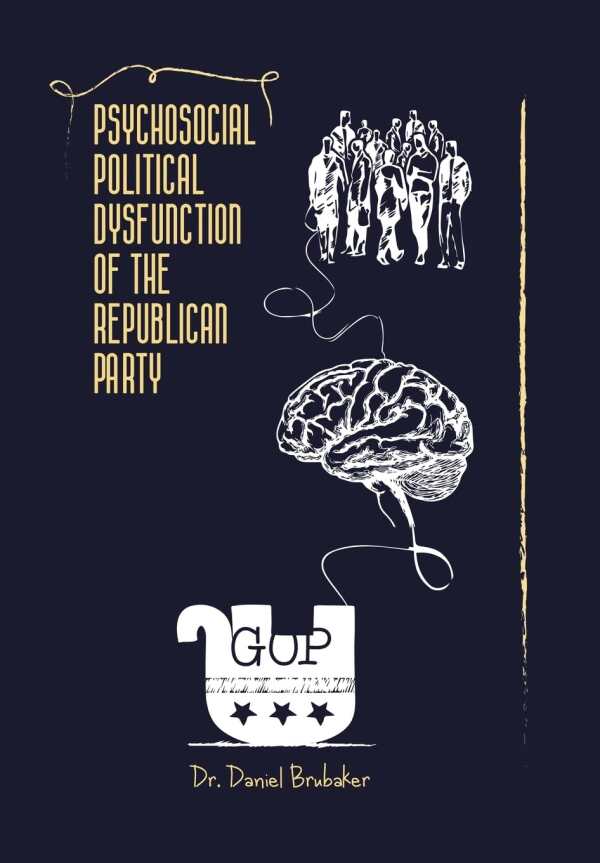Psychosocial Political Dysfunction of the Republican Party
Covering an eclectic array of subjects, Psychosocial Political Dysfunction of the Republican Party is a bracing attack on contemporary conservative politics.
Daniel Brubaker’s provocative political screed Psychosocial Political Dysfunction of the Republican Party diagnoses Republican politicians and ideologies with psychological diseases.
Mixing individual psychological diagnoses with sweeping statements about the state of the Republican Party, the book makes a series of claims that link political dysfunctions with psychological disorders. Among its assertions are the ideas that Republican politicians fail to understand, differentiate, or meaningfully consider the differences between fact and fiction; that, developmentally, they “behave like toddlers”; that they weaponize terms like socialism and utilitarianism without fully understanding them; and that Republicans are increasingly supportive of fascist styles of governance. Arguing that these are relatively recent developments, the book insists that the Republican Party must be made aware of its diseases in order to begin the processes of its reformation.
While the book is careful to outline its intended course of argument, its chapters favor tangential material that has little to do with its central thesis about the Republican Party. Ranging from arcane discussions of the scientific method to the minutia of social and linguistic theories, this book is less geared toward proving an argument than educating readers on a number of unrelated subjects. The chapter on Republican politicians’ tendency to mix facts and falsehoods, for example, provides little evidence or analysis of its central claim. Instead, its fifty pages dive into esoteric discussions of epistemology, including lists of uncited definitions for words including existential, ontology, and truth.
Digressions into complex and unrelated subjects are a dominant pattern. The chapter dedicated to the toddler-like behavior of Republican politicians evinces this with its truncated introductions to theories of early childhood development, language acquisition, and behavioral disorders—discussions not linked back to politics or Republican behavior. And the chapter summaries have little to do with the material discussed inside their chapters either. Awkward language and inconsistent formatting further mar the book’s delivery. Citations are haphazard and often interrupt the prose; the reference page lists Google and Wikipedia at a disproportionate rate.
The book is at its strongest when it’s elaborating on the idiosyncratic history of fascism and the Republican Party, from the early twentieth century onward. Despite its generalizations and undersupported comparisons between Adolf Hitler, Benito Mussolini, Donald Trump, and other contemporary American politicians, the book does a compelling job of linking right-wing extremism with the Great Depression and making analogies to Weimar-era Germany. Here and elsewhere, it demonstrates broad, multidisciplinary knowledge. But the book’s conclusion—a list of policy recommendations and desirable traits for an American president to possess—does not address the central thesis regarding psychological disorders, leaving the book without any definitive statement on the significance of this claim or possibilities for rectifying it.
Covering an eclectic array of subjects, Psychosocial Political Dysfunction of the Republican Party is a bracing attack on contemporary conservative politics.
Reviewed by
Willem Marx
Disclosure: This article is not an endorsement, but a review. The publisher of this book provided free copies of the book and paid a small fee to have their book reviewed by a professional reviewer. Foreword Reviews and Clarion Reviews make no guarantee that the publisher will receive a positive review. Foreword Magazine, Inc. is disclosing this in accordance with the Federal Trade Commission’s 16 CFR, Part 255.

